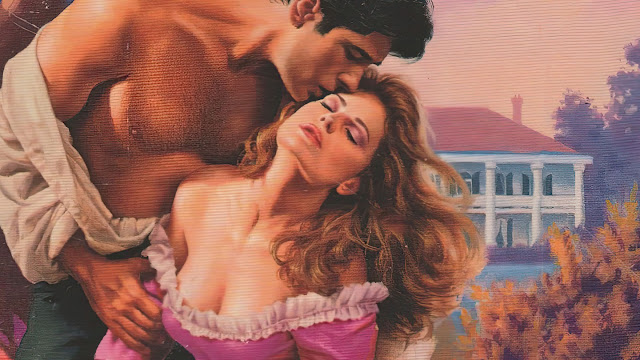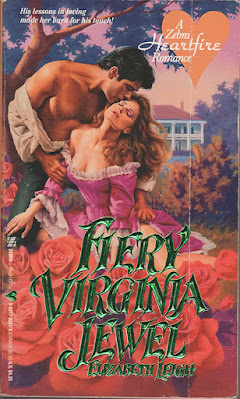Episode 74 – Fiery Virginia Jewel by Elizabeth Leigh
Glynna is a beautiful teenager living on the Virginia frontier on the eve of the French and Indian War. Kane (seriously) is… what does this guy do, actually? He’s a rich dude masquerading as a tutor but really on the hunt for a tiara his mom misplaced. Is that really a career path? Anyway, this is Fiery Virginia Jewel, by Elizabeth Leigh…. or is it? You’ll have to listen to the episode to find out whether this author exists or not – we put Steve Ammidown at Bowling Green State University on it, even! Investigations were investigated! (Spoiler: maybe? It’s murky?)
This book is absolutely chockablock with trauma – Glynna gets abducted and serially assaulted by a guy who keeps her tied up in a cellar, which is not great, but on the other hand it’s actually handled pretty well by this book! Which is a surprise, considering this book! There’s a serial killer! There a really dumb guy, which is its own agony! There’s a ton of racism against enslaved African Americans and a little unwelcome bit in there about Native Americans! There’s a total disregard for anything even remotely historical, which.. I mean why write this very specific period if you don’t care at all?!
So, for that reason, we have a special guest – Adrienne is, believe it or not, somebody who listens to our podcast who isn’t related to us at all! A genuine over-the-transom fan! She’s an independent historian based in Richmond, VA. You can often find her buried in 60 lbs of bread dough for the sake of experimental archaeology or making reproductions of hats found in shipwrecks. She lives in the 21st century 9-5, M-F. (She’s worked at the Library of Virginia, Henricus Historical Park, and Gettysburg National Military Park – so she knows her stuff.)
For those of you who don’t remember your ninth grade US history any better than this Elizabeth Leigh lady does, here’s a refresher via Fort Dobbs site manager Scott Douglas (heh, bodice ripping blockbuster):
England and France had been enemies for centuries before either claimed parts of the New World. In North America, several conflicts over territory in the early 18th century climaxed in the French and Indian War.
As a result of France’s growing attempt to connect her extensive dominions in North America by uniting Canada with Louisiana, she took land claimed to be within the Province of Virginia and began a line of military posts from the Great Lakes to the Ohio Valley. Virginia responded by sending a unit of soldiers, commanded by 22 year-old Lieutenant-Colonel George Washington, into western Pennsylvania. Washington ambushed a party of French soldiers in 1754, thus starting the French and Indian War: a conflict what would prove to the beginning of a global struggle for empire.
Other colonies were quick to raise soldiers to send to Virginia’s aid. These “provincials”, or American colonists, would fight side by side with British Army troops in several major campaigns during the conflict. Both European powers formed alliances with dozens of Native American nations, whose aid proved critical for military success. The French had more numerous allies early in the conflict, which helped them defeat several early British assaults.
Perhaps the best known and most-romanticized of these campaigns took place in the along the Hudson River in 1757, which included the siege and surrender of the British Fort William Henry to French and Indian forces. James Fennimore Cooper used this as the setting for his 1826 novel “The Last of the Mohicans.” This novel was adapted into the bodice-ripping blockbuster film by the same name in 1992, starring Daniel Day-Lewis and his flowing locks of hair.
By 1759, British generals brought more experienced and greater resources to bear on the French and tide of war turned in Britain’s favor as they captured the Ohio country. By 1761, their armies had secured control of Canada, and had defeated the Cherokee in the southern colonies. The British also triumphed in their global campaigns, capturing territory in the Caribbean, West Africa, and India, and defeating the French in Europe itself by 1763.
The consequences of the French and Indian War changed the balance of power in the larger world in Britain’s favor, but also strained political relations with her North American colonies. Just 12 years later, a new war, the American Revolution, would explode and lead to the creation of a new nation.
Look, that man is fine in that movie and I will fight you. Adrienne was a real champ, putting up with us and all kinds of nonsense – we literally had an earthquake during recording, she got kicked out of a library, it turned out that the author might not be a person… she was very generous with her time and knowledge and we had the best time.
She also shared this fascinating article that gives more context to the kinds of goods sold at these backcountry stores in this time period, which means that this silly book actually got some stuff accidentally right about the fabrics available to these characters! Who’da thunk it?


